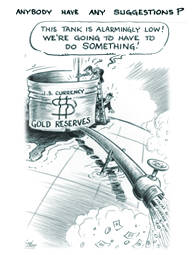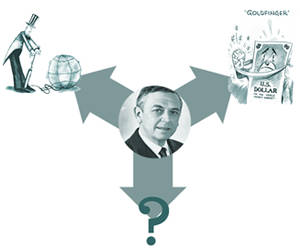Money
Matters: An IMF Exhibit -- The Importance of Global Cooperation
|
System
in Crisis (1959-1971)
|
Part
4 of 7
|
|
|
|
| |
The
Dollar Glut
|
| <--Previous |
Next--> |
| |
|
"Providing reserves and
exchanges for the whole world is too much for one country and one
currency to bear."
Henry H. Fowler
U.S. Secretary of the Treasury
|

credits |
|
Increasingly,
the IMF and the international community realized that the Bretton
Woods system - based on the gold standard and using dollars as the
main reserve currency - had a serious flaw. The postwar "dollar
gap" abroad had become a "dollar glut" by 1960.
|
Liquidity
and Deficit
|
|
Continuous
U.S. balance of payments deficits during the 1950s had provided
the world with liquidity, but had also caused dollar reserves to
build up in the central banks of Europe and Japan. As the central
banks redeemed these dollars for gold, the U.S. gold reserves dipped
dangerously low.
How
could the threatened system be fixed?
|
If
there were too many dollars out there, why didn't the United States
simply stop spending so much abroad?
|
|
The
United States enjoyed the benefits of being able to spend money
freely, such as acquiring commodities and consumer products from
abroad. In addition, the U.S. foreign-policy goal of containing
Communism in the face of the Cold War and decolonization kept the
dollars flowing.
|
Triffin's
Dilemma
|
|
Testifying
before the U.S. Congress in 1960, economist Robert Triffin
exposed a fundamental problem in the international monetary
system.
|
| If
the United States stopped running balance of payments deficits,
the international community would lose its largest source of
additions to reserves. The resulting shortage of liquidity could
pull the world economy into a contractionary spiral, leading
to instability. |

credits |
If
U.S. deficits continued, a steady stream of dollars would continue
to fuel world economic growth. However, excessive U.S. deficits
(dollar glut) would erode confidence in the value of the U.S.
dollar. Without confidence in the dollar, it would no longer
be accepted as the world's reserve currency. The fixed exchange
rate system could break down, leading to instability. |
Triffin's
Solution
|
|
Triffin
proposed the creation of new reserve units. These units would
not depend on gold or currencies, but would add to the world's
total liquidity. Creating such a new reserve would allow the
United States to reduce its balance of payments deficits,
while still allowing for global economic expansion.
|
|
"A
fundamental reform of the international monetary system has
long been
overdue. Its necessity and
urgency are further highlighted today by the imminent threat
to the once mighty U.S. dollar."
Robert
Triffin
November 1960
|
| |
|
|
| <--Previous |
Next--> |